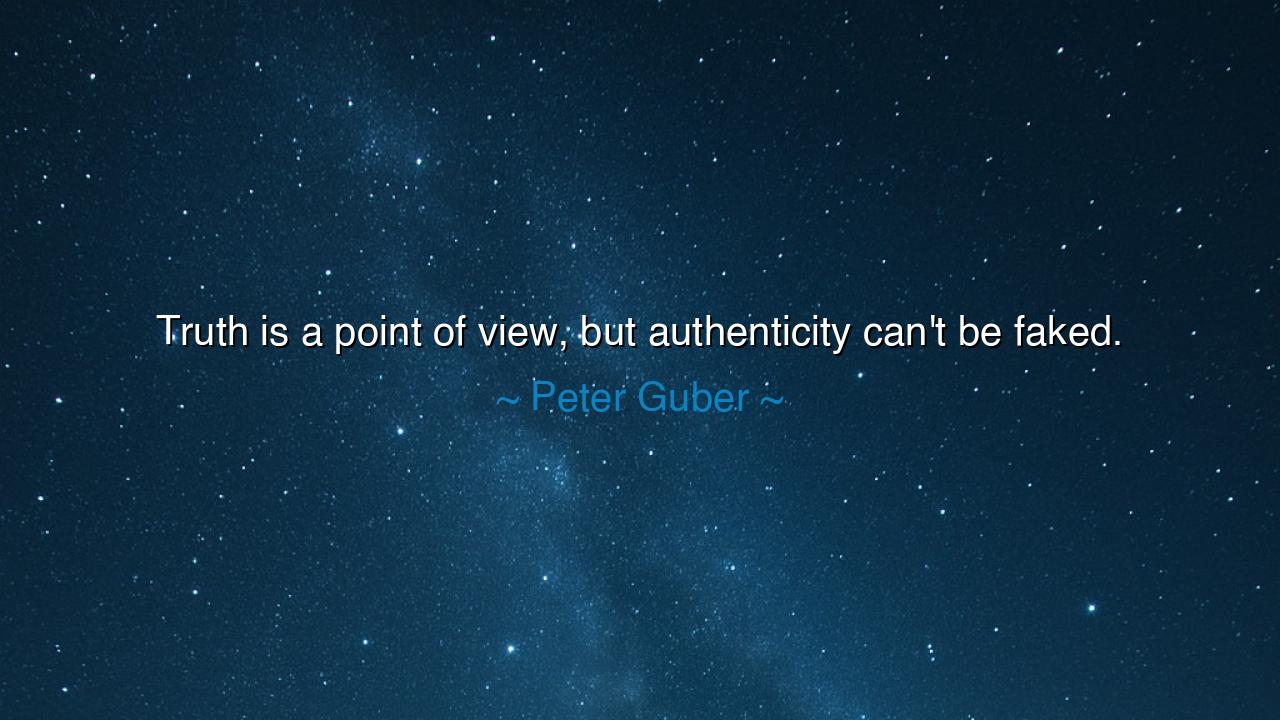
Truth is a point of view, but authenticity can't be faked.






The words of Peter Guber—“Truth is a point of view, but authenticity can’t be faked”—resound like a riddle, yet within them lies a profound teaching about the human heart. He reminds us that truth, as men speak it, is often shaped by perspective, colored by culture, bent by circumstance. What one person calls truth may differ from another’s, for it is seen through the lens of experience. Yet there is something deeper, more unshakable, more universal than truth as opinion: authenticity. This is the essence of being real, the state where word, action, and soul align. It is beyond disguise, for the human spirit can sense it. Authenticity cannot be faked, for even when lies are clever, the heart knows when it meets something genuine.
The ancients, too, recognized this difference. The Greeks debated endlessly what truth was, whether it was perception, reason, or divine order. Yet even they revered the man who lived in harmony with himself, whose actions flowed naturally from his essence. Socrates, when offered escape from death, refused, for to betray his principles would be to live falsely. His truth might have been debated by philosophers, but his authenticity was unquestionable. It was this authenticity, not abstract argument, that gave his life enduring power.
History gives us many witnesses to this wisdom. Consider Abraham Lincoln, who often faced accusations, criticism, and even ridicule. His truth, in matters of law, war, and morality, was contested in his own day. Yet what set him apart was his authenticity. He did not pretend to be flawless, nor did he bend his spirit to please all sides. His authenticity—his honesty of character, his simplicity of speech, his constancy of principle—shone through. Even his enemies recognized it. And when the centuries passed, what endured was not merely his arguments, but the authenticity of the man himself.
In contrast, history remembers those who lacked this inner strength. Leaders who cloaked themselves in lies or pretense, even when their “truths” seemed persuasive, were unmasked by time. Consider Richard Nixon, whose words were often framed as truth, yet whose lack of authenticity was exposed in the scandal of Watergate. His downfall was not only the lies he told, but the fact that people sensed the absence of genuine character. Truth, framed as argument, can be debated. But authenticity—or its lack—cannot be hidden forever.
The wisdom of Guber also speaks to our daily lives. Each of us holds a version of truth, shaped by our path. We may argue, persuade, even insist that others see it as we do. Yet what truly convinces others is not our arguments alone, but our authenticity. When a man speaks from the core of his being, when his life reflects his words, others believe—not because they are persuaded by reason alone, but because they feel the reality of his soul. Authenticity has a power greater than logic; it moves hearts because it cannot be forged.
The lesson is this: do not strive to appear true—strive to be authentic. Speak from your heart, act from your values, and let your life align with your essence. Do not wear masks to please others, nor pretend to be what you are not, for such disguises will crumble, and the world will see through them. Authenticity requires courage, for it means being vulnerable, imperfect, and real. Yet it is this very realness that people trust, cherish, and remember.
Therefore, O seeker, remember Guber’s wisdom: truth may be debated, but authenticity is undeniable. You may not always convince others of your truth, but if you live authentically, your presence will carry weight, your words will hold power, and your legacy will endure. Let your speech and deeds flow from your true self, and you will need no disguise. For while truth may be a point of view, authenticity is the light of the soul—and no man can counterfeit its flame.






PATruong Thi Phuong Anh
I’ve always believed that authenticity is key to meaningful connections, and this quote resonates deeply with me. But I wonder, can someone ever be truly authentic if their truth is influenced by outside factors—like societal expectations or past experiences? Is complete authenticity possible, or is it just an ideal we strive for? I’d love to hear how you define and live authenticity in your own life.
UGUser Google
I completely agree with the idea that authenticity can’t be faked. It reminds me of all the times I’ve seen someone try to put on a facade, but you can always tell when it’s not genuine. But if truth is subjective, does that mean there’s no universal truth? How do you reconcile differing truths in a world where authenticity is valued above all else? It’s a tough balance, isn’t it?
LNKim Ngan Luu Ngoc
It’s interesting how the quote distinguishes between truth and authenticity. I agree that truth can vary depending on perspective, but authenticity feels like something that must be genuine, no matter what. Do you think that in today’s world, people are increasingly willing to sacrifice authenticity for the sake of fitting in or being accepted? How do you maintain authenticity when the pressure to conform is so strong?
THAn Tran Thai Hoang
This quote really got me thinking about how subjective truth can be. Everyone sees the world through their own lens, so what’s true for one person may not be true for another. But the part about authenticity is so powerful—it's something that can’t be faked. Have you ever experienced a situation where someone pretended to be authentic but you could tell it wasn’t real? I’d love to hear your thoughts.